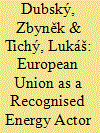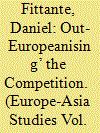| Srl | Item |
| 1 |
ID:
188308


|
|
|
|
|
| Summary/Abstract |
This article analyses the nature and the evolution of state capture in Serbia. I approach this process from a micro-level perspective, utilising interview data and rich case studies, focusing on the interaction between political parties and business. In the context of high political uncertainty and underdeveloped institutions in the period 2000–2012, oligarchs benefited from the privatisation process and resource extraction, while political parties were after short-term extraction. After 2012, amid low political uncertainty, a top-down political colonisation by the ruling party can be observed, manifesting through the involvement of businesses directly owned by political officeholders or their families in the state-capture dynamic.
|
|
|
|
|
|
|
|
|
|
|
|
|
|
|
|
| 2 |
ID:
188307


|
|
|
|
|
| Summary/Abstract |
EU energy policy influences the energy cooperation of its member states with Russia. Thus, how Russia perceives the European Union as an energy actor is significant. The article draws on an analysis of the discourse—and the topics within it—of public statements by Russian political leaders and officials regarding energy relations with the European Union in the period 2014–2019. By interpreting the core themes and content, it attempts to prove whether the European Union is recognised as an energy actor by Russia or whether Russia, rather, continues to acknowledge individual states as actors.
|
|
|
|
|
|
|
|
|
|
|
|
|
|
|
|
| 3 |
ID:
188311


|
|
|
|
|
| Summary/Abstract |
Using interview data, the article demonstrates that Uzbekistani residents of Japan understand and explain their stay in Japan largely as temporary, in line with the concept of ‘sojourning’. In contrast to previous studies that operationalise sojourning according to legal status or ‘preparations to return home’, this article claims that such ‘sojourning’ needs to be treated as a constantly changing socially shaped discursive category employed by respondents to mitigate challenges such as economic hardship, discrimination and cultural assimilation. Additionally, male expatriates may describe their sojourning in culturally specific religious terms, as wanderers (musofir) in search of life experience abroad.
|
|
|
|
|
|
|
|
|
|
|
|
|
|
|
|
| 4 |
ID:
188304


|
|
|
|
|
| Summary/Abstract |
This article examines how collective farmers and collective farm administrations used expulsion to police their communities. They expelled people who threatened the economic stability of the collective farm by engaging in otkhod (seasonal migrant labour), theft or absenteeism. These expulsions often ran directly counter to central directives which targeted class enemies for expulsion in the early 1930s and later sought to curtail the practice and then forbade it outright. The fact that collective farms repeatedly expelled people in defiance of central or regional guidance demonstrates the lack of control the Soviet state and Communist Party often had over the countryside in the 1930s.
|
|
|
|
|
|
|
|
|
|
|
|
|
|
|
|
| 5 |
ID:
188309


|
|
|
|
|
| Summary/Abstract |
Building on Europeanisation scholarship, this article unpacks the instrumental rhetoric of Armenian genocide recognition in Bulgaria. In Bulgaria’s 2015 parliamentary hearings on the issue, diverse political actors—from liberal to nationalist political party members—formed unlikely coalitions and strategically instrumentalised Armenian genocide recognition as a way to signal ‘Europeanisation’ in pursuing very distinct ends.
|
|
|
|
|
|
|
|
|
|
|
|
|
|
|
|
| 6 |
ID:
188306


|
|
|
|
|
| Summary/Abstract |
In Poland the early 1970s were characterised by a huge number of investments in industry, infrastructure and housing. An important role in the supervision of these projects was played by the leaders of provincial party committees. This study examines the documents of four provincial party committees in the years 1971–1974. The results show that apparatchiks’ strategies differed, depending on whether the provincial party leadership was strong or weak. The study suggests that the active party supervision resulted in extra costs for enterprises (such as producing reports for committees or organisation of special meetings with party supervisors), although the support of apparatchiks could help in raising funds.
|
|
|
|
|
|
|
|
|
|
|
|
|
|
|
|
| 7 |
ID:
188305


|
|
|
|
|
| Summary/Abstract |
This article examines Soviet approaches to sexual health in the Brezhnev era (1964–1982), specifically venereal diseases (VD). After the death of Stalin, the Soviet leadership adopted new methods for regulating the behaviour of Soviet citizens based on collective adherence to specific moral codes. State ministries took tentative steps towards mass sex education. In the 1960s, the Soviet leadership relaunched the ‘struggle with VD’, a state-led campaign to drastically reduce rates of infection. This article explores the enactment of this campaign in the Latvian SSR, where VD cases exceeded all-union averages and where Party leadership adopted a stringent approach to perceived sexual misconduct.
|
|
|
|
|
|
|
|
|
|
|
|
|
|
|
|
| 8 |
ID:
188310


|
|
|
|
|
| Summary/Abstract |
The annexation of Crimea and occupation of parts of Donbas removed from Ukraine’s electorate 3.5 million voters that had previously voted heavily for pro-Russian parties. Examining the 2019 presidential and parliamentary elections, this article asks two questions: how might the results of the election have been different had voters in occupied Donbas been able to vote? Do 2019 voting patterns support the thesis that the Ukrainian electorate had significantly changed its values in the period 2014–2019 or had long-standing cleavages endured? Voter alignments identified before 2014 persisted, with important implications for Russia’s efforts to win influence in Ukraine. The weakening of pro-Russian parties caused by Russia’s invasion in 2014 helped create the conditions in which Russia could not achieve its goals without an all-out invasion.
|
|
|
|
|
|
|
|
|
|
|
|
|
|
|
|